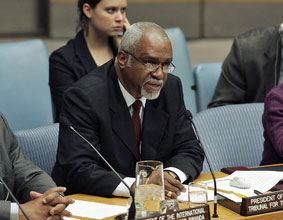| Press Release |
PRESIDENT
|
| (Exclusively for the use of the media. Not an official document) |
|
The Hague, 4 June 2009
NJ/MOW/1320e
 |
| ICTY President, Judge Patrick Robinson |
In today’s address to the UN Security Council, the Tribunal’s President, Judge Patrick Robinson, highlighted the organisation’s successes and key challenges ahead as part of his report on the status of the Tribunal’s completion strategy.
The President informed the Security Council that, during the last six months, the Tribunal had continued to focus its energies on completing its work as expeditiously as possible. Three appeal judgements had been rendered, and seven trials were being heard simultaneously in three courtrooms. Of the remaining case load, the trial of two accused, Jovica Stanišić and Franko Simatović, had just begun and that of Radovan Karadžić would commence in late August 2009. The case of Zdravko Tolimir and the case of Mićo Stanišić and Stojan Župljanin would commence in September 2009. The President reported that current estimates suggested that all but three of the ICTY’s trials would conclude in 2010, two more in early 2011, and the final trial, that of Karadžić, in early 2012.
The President, however, stressed that one serious hurdle remained: the continued flight from justice of Ratko Mladić and Goran Hadžić. He warned that, if these two men were not brought to justice, it would leave a stain on the Security Council’s historic contribution to peace-building in the former Yugoslavia.
A joint ICTY-ICTR proposal was made by the President for the re-deployment of Judges to the Appeals Chamber, to deal with the anticipated increase in the number of appeals in the coming years, as more and more trials are completed. The President also emphasised that an extension of the mandates of the permanent trial and appeal Judges and the Tribunal’s ad litem Judges was necessary in order for the Tribunal to complete its work. The President suggested that countries with highly developed judicial systems could make a greater effort to accept a limited number of Rule 11 bis transfers and that the Tribunal, with the Security Council’s authorisation, could make a renewed effort to transfer to a European country one major case. Finally, the President reported that the high turnover of staff in the Conference and Language Services Section had occasionally affected the pace of proceedings and had to be remedied soon.
On the issue of staff retention, the President reported that, in the last three months, the Tribunal had lost 82 staff members, a rough average of 27 per month. He appealed to the Member States of the Security Council to exercise foresight so that concrete measures could be implemented now to retain the Tribunal’s uniquely qualified staff.
The President also noted the negative impact on the expeditious progress of trials that had been caused by people attempting to interfere with the administration of justice, citing the trial of Vojislav Šešelj as an example. He reported to the Security Council that a working group had been established to examine ways in which contempt may be dealt with, without delaying proceedings, and that the results of this working group would be submitted shortly.
The President thanked the Security Council Working Group on the ad hoc Tribunals and the Office of the Legal Counsel for their work on the residual mechanism. The Security Council was urged to ensure that the decisions it makes regarding the residual functions of the Tribunal guaranteed the long term integrity of its work.
The President also pointed out that, while the primary focus of the Tribunal was its trials and appeals, the Tribunal had also diligently worked towards the strengthening of competent national judicial systems of the former Yugoslavia, in accordance with the direction of the Council contained in resolutions 1503 and 1534. Many concrete steps had been initiated and successfully completed, such as the production of a manual collecting the Tribunal’s expertise for use by domestic institutions trying war crimes. Together with its partner organisations, the Tribunal was planning the implementation of further capacity building priorities, identified in direct consultation with colleagues in the former Yugoslavia.
In closing, the President informed the Security Council that, in the very near future, the Tribunal’s cases would be completed, provided that the Security Council ensured that the Tribunal was given sufficient resources to complete its work expeditiously and fairly and provided that sufficient incentives were adopted immediately to retain staff.
The President and Prosecutor submit to the Security Council their assessments on the progress made towards implementation of the completion strategy of the Tribunal in accordance with resolution 1534. The reports, filed every six months, set out the measures that have been taken and that remain to be taken to meet the completion including the transfer of cases to competent national jurisdictions.
Additionally, the President submits an Annual Report to the UN Security Council and General Assembly. The reports, usually submitted in November, cover the twelve-month period of 1 August - 31 July and include an overview of activities involving all sections of the Tribunal.
Since its inception 15 years ago the Tribunal has indicted 161 persons for war crimes committed on the territory of the former Yugoslavia. The proceedings against 120 individuals have been completed. With proceedings ongoing against 39 accused only two indictees remain on the run awaiting arrest – Ratko Mladić and Goran Hadžić.
The full text of the President's speech can be found at:
The latest Completion Strategy Report of the President can be found at:
In English
In French
*****
International Criminal Tribunal for the former Yugoslavia
For more information, please contact our Media Office in The Hague
Tel.: +31-70-512-5343; 512-5356 Fax: +31-70-512-5355 - Email: press [at] icty.org ()

